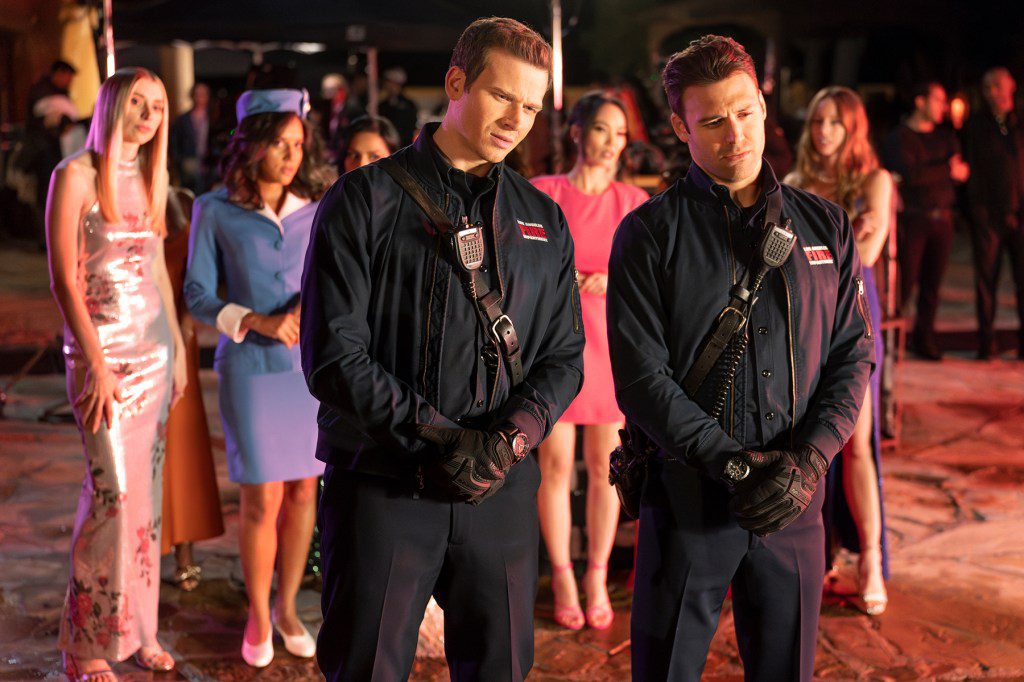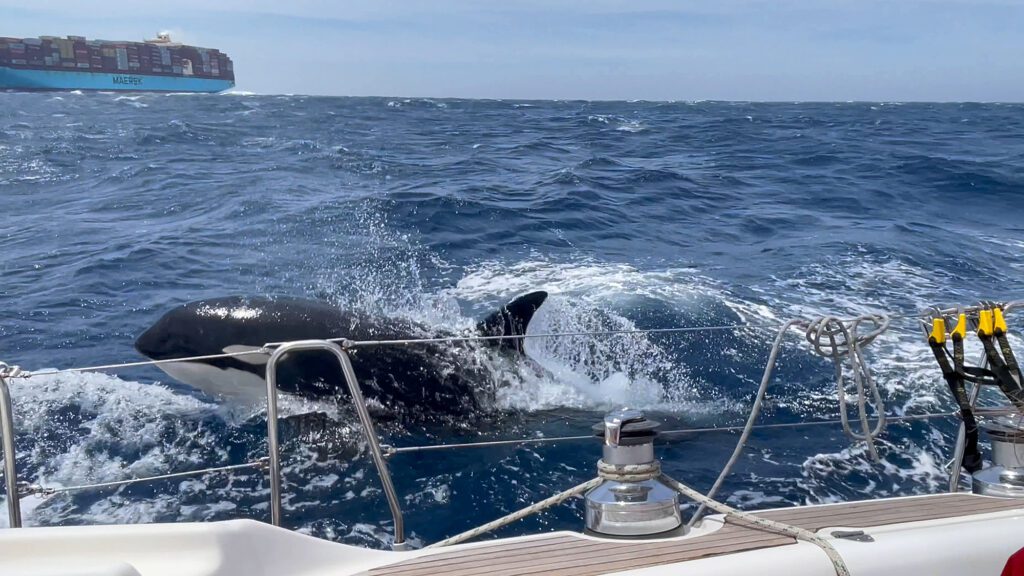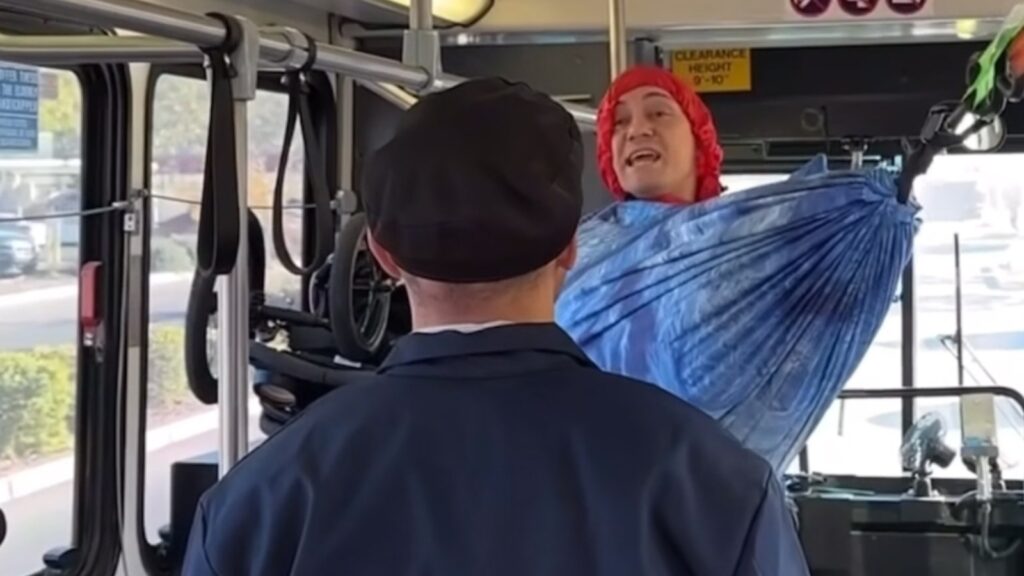‘9-1-1’ Committed to a Gay Character. Will Other Shows Follow Suit?
When TV series 9-1-1 aired its 100th episode on April 4, the Los Angeles-set ABC firefighter drama, known for pitting its characters against tsunamis and hijacked cruise ships, did something so wild, so unexpected, that even day-one fans were left shocked: They had one of their main characters kiss another man.
The main character in question — self-avowed reformed sex addict Buck (Oliver Stark) — has been a fan favorite since the Ryan Murphy series premiered in 2018. The young firefighter quickly became known for his womanizing ways, which were often contrasted with his deep and meaningful friendship with fellow firefighter Eddie Diaz (Ryan Guzman). The two work together, hang out together, and eventually develop such a devoted friendship that Buck becomes a second parent to Eddie’s son, Christopher.
Online, Buck has also become a popular character for viewers to read as queer. They “ship” him — want him to be in a romantic relationship — with Eddie. While the newest season of 9-1-1 doesn’t see Buck get together with Eddie, but another gay firefighter named Tommy (Lou Ferigno Jr.), queer members of the 9-1-1 fandom have considered it a major victory. 9-1-1 cast tell Rolling Stone the character having a queer journey has been a possibility for at least three seasons, and was not a sudden decision. But as Buck’s new storyline has finally converged with pre-existing fan theories about the character, it’s sparked discussions online about past instances of queerbaiting and whether fan desires are actively making a difference in these shows.
Queerbaiting is a term for when shows use queer relationships to draw viewers in, but never actualize them. It gained widespread use in online fandoms in the 2000s, with television series like Buffy the Vampire Slayer, Supernatural, Rizzoli and Isles, and Teen Wolf, which all included peripheral gay characters but never committed to allowing their main character to be queer. And while 9-1-1 is only one show, fans are curious — could this decision spark a sea change in how network tv approaches queer storylines?
Oliver Stark, who’s played Buck for six years, has been aware of fan theories about Buck’s sexuality for a long time. But while showrunner Tim Minear floated the idea to him as a possibility for Season Four, it was ultimately axed. “It was shut down from above,” Stark says. “I don’t know from where exactly but somebody had not wanted that story to progress then.”
The latest episodes of 9-1-1 have followed Buck as he became increasingly jealous and territorial about Eddie’s relationship with fellow first-responder Tommy. After trying and failing to figure out his emotions, Buck realizes that he’s actually jealous that Eddie gets to hang out with Tommy, and seals his attraction with a kiss. Subsequent scenes and episodes tackle the struggles Buck has with coming out late in life, including figuring out who to come out to and how to date men. Stark, who says he’s been open to the idea of Buck being bisexual since Season Four, acknowledges that queer fans aren’t just imagining chemistry between Buck and Eddie that’s been present since Season Two.
“[Eddie’s] character is introduced topless with ‘Whatta Man’ [by Salt-N-Peppa] playing and Buck slow motion turning [to watch] him. So to the credit of the fans, it would be hard for them to not read that aspect into it,” Stark says. “And ever since [Tim and I] had that conversation I’ve known of it consciously as a possibility, so I think it couldn’t not start to bleed into the work.”
Oliver Stark as Buck and Ryan Guzman as Eddi in 9-1-1.
Chris Willard/Disney/ABC
Minear tells Rolling Stone that he hasn’t just been aware of fan reactions, he’s actually changed storylines in the past to avoid being accused of queerbaiting. But rather than help, he says it made the show worse.
“Nobody wants to be accused of queerbaiting so I kind of stopped writing those characters together. And I think it hurt the show because I was so afraid to be accused of something that I wasn’t going where I would naturally go with the stories,” Minear says. “I just decided that I just have to write the thing that I think is right. I just have to be honest with the story I’m telling and let the chips fall where they may.”
Since the rise of social media, the relationship between fan desires and network plans has grown increasingly complicated, especially as fans have more access than ever to give actors and writers their direct demands. Television superfan Chynna McFarland has long felt disappointed by TV shows. The California TikToker, 30, tells Rolling Stone that even though queer characters are more present in network shows nowadays, she often finds them relegated to side tropes and stereotypes. While she enjoys shipping not-explicitly queer characters, she says that queerbaiting has actually led her to stop watching some shows entirely. One of those shows she had previously abandoned was 9-1-1 because she felt like Buck’s character held the telltale signs of queerbaiting. Now, she’s hopeful that Buck’s storyline means the suits behind network TV are finally realizing the power of listening to audiences and what authentic portrayal of queer life could actually mean for more progress.
“I think shows have a responsibility to be mindful of their audience,” McFarland says. “There’s nothing wrong with a little bit of anticipation, [but] at some point it just becomes taunting. While I understand that showrunners and writers have a vision and a flow for these shows, I also think that being open to hearing what your fan base feels and wants is crucial to the loyalty and longevity of shows.
While network television is often dismissed when compared to prestige channels and new streaming content, its massive viewership still gives it a major impact on culture. To compare, the series finale of HBO’s Succession drew 2.9 million viewers, a record viewership metric according to HBO. The premiere of season 7 of 9-1-1 had 4.93 million viewers and added an additional 8.5 million viewers after it was released on streaming. According to Julia Himberg, a film and media studies professor at Arizona State University, the sheer number of people network television shows reach often means popular shows have a direct relationship with social change and understanding — which makes representation increasingly important for viewers and queerbaiting especially hurtful.
“Viewers are very sensitive to [queerbaiting] because they are on the hunt to see themselves and when they feel that they’ve been suckered into watching something, it feels like being used,” Himberg explains. “Queerbaiting signals to queer people [that] ‘There are queer characters here.’ And so when that doesn’t pan out, you alienate people and bring up this sort of history of invisibility that has plagued television, especially around LGBTQ people. “
And viewership numbers often show that leaning into popular storylines can have a positive effect. In the case of 9-1-1, the follow-up episode to Buck’s romance reveal, ‘Buck, Bothered, and Bewildered,’ doubled its viewership when it was released on streaming, marking the highest ratings for 9-1-1 since its 2023 season finale, according to ABC. Now, online fandoms are hopeful that other network shows might take note.
“I wish people knew that shipping is about not just ‘Oh they look cute together.’ For me it’s about connection to the characters,” McFarland says. “Ships allow us to find our ‘happily ever after’ in a world full of uncertainty. Ships keep us coming back for more and more. Not all queer people come out or even acknowledge their queerness at young ages. Some of us come into ourselves later in life and seeing a man in his thirties beginning his journey has been so beautiful to see.”





